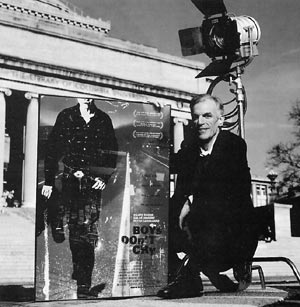|
A film star is born
Columbia's movie school rivals NYU's
From Crain's New York Business
December 11-17, 2000
by Mirian Kreinin Souccar
When
Joan Stein won the 27th Annual Student Academy Award for best
narrative film last summer, people took notice of more than
a moving film about the plight of Jews during the war.
 Columbia University Film Division Co-Chair Dan Klienman is a big supporter of 1918 - the film.
Columbia University Film Division Co-Chair Dan Klienman is a big supporter of 1918 - the film.
The award also cast her alma mater, the Columbia University
School of the Arts Film Division, in a new and rosy light
- marking as it did the third time in the last four years
that the school had produced a Student Academy Award winner.
"Our
time has come," says Bruce Ferguson, dean of Columbia's
School of the Arts, "The kinds of awards we've been receiving
are a major sign of our presence in the film world."
After years of laboring in the long shadow of its world-renowned
downtown competitor, the film department of New York University's
Tisch School of the Arts, Columbia has suddenly emerged on
center stage. With a recent slew of awards from not just the
Academy, but the prestigious Directors Guild as well, and
with a growing roster of successful alumni, Columbia is clearly
on a roll. These days, it is attracting not just more talented
students and staff - including Dan Klienman, who was hired
away from NYU four years ago and was recently named chairman
of the film school - but more funding, too.
"Columbia's film program has definitely gotten more visible,"
says a spokeswoman for Lifetime Entertainment in New York.
"It is now mentioned in the same breath as NYU."
Many say that the buzz began with a pair of exceptionally
talented students: Kimberly Peirce and James Mangold. It was
Ms. Peirce's 1996 graduate thesis project that became the
basis of this year's Oscar-winning Boys Don't Cry. This was
also the year that Mr. Mangold, class of 1999, won raves for
his direction of the Oscar-winning movie Girl, Interrupted.
Spikes of its own
"A film school's reputation comes from what its graduates
are doing," Ms. Stein says. "It used to be Spike
Lee and others who had graduated from NYU. Now, its Columbia
that has all these great alumni."
It is also increasingly evident that it has a terrific crop
of alumni-to-be. This year, Columbia students took top honors
in three out of four categories in the Directors Guild of
America's annual East Coast student filmmakers awards. Just
two years earlier, Columbia had become the first university
in history to win all four of the DGAs prize categories.
"There's
a higher and higher profile to the graduates from Columbia,
and that's how you tend to judge (a school)," says Michael
Lynne, president and chief operating officer of New Line Cinema,
a film distribution and production house in New York.
Columbia officials trace the basis for its success back to
a key decision five years ago to spend money to greatly enhance
its production capabilities.
"We
were an outstanding screenwriting department, with relatively
little production," says Mr. Kleinman. To beef up production,
the school added seven complete camera packages—including
35mm film cameras, lights and sound equipment - bringing the
total to nine. It also added no fewer than 25 digital video
cameras and, more important, two full-time directing professors.
Now that its students are actually able to make and show the
movies that they have long been writing screenplays for, Columbia's
strengths have at last burst into plain view.
"People are now recognizing just how good we are,"
Mr. Kleinman says.
Grudging respect
 Today,
even Columbia's august downtown rival has to acknowledge the
school's progress. "We still are stronger on the production
end, but they're looking to even that out substantially,"
says Bill Reilly, professor of film and television in NYUs
graduate film program. Today,
even Columbia's august downtown rival has to acknowledge the
school's progress. "We still are stronger on the production
end, but they're looking to even that out substantially,"
says Bill Reilly, professor of film and television in NYUs
graduate film program.
Proof of Columbia's progress in closing the gap can be seen
in the long line of applicants eager to get in. In 2000, nearly
500 people applied for the program's 90 slots, up from 480
the previous year and 420 in 1998. NYU receives about 700
applications each year for about 40 slots in its graduate
film program.
One of Mr. Kleinman's plans as chairman is to challenge NYU
head-on by expanding the department's cinematography offerings
and its editing capability, both areas in which NYU excels.
With the help of two grants from the university totaling $1
million, Columbia's School of the Arts recently built a new
digital media center, where film students have round-the-clock
access to 24 digital editing machines.
Outsiders are also contributing to Columbia's ambitious plans.
Erica Marks, director of development for Columbia's School
of the Arts, says contributions have grown substantially.
For the fiscal year 2000, $765,000 was raised for the film
division, up 56% from the previous year. For the first four
months of this fiscal year, $370,000 already has been raised.
The next item on the film departments wish list is a brand-new
facility. Columbia recently gave the School of the Arts the
green light to hire an architect to conduct a feasibility
study for renovating and expanding Prentis Hall, a building
on West 125th Street. The film division would get a portion
of the building for a new screening room and soundstage.
Mr.
Ferguson says the university is increasingly recognizing the
arts as a priority. "Our film program is different in
that it mixes producing, directing and screenwriting together,"
he says. "More recently, the industry has been paying
more attention to those kinds of students who graduate who
have multiple skills."
It is also paying more attention to the schools that turn
them out.
Recent
Student Academy Awards
First Prize - Narrative / Dramatic category
2004 was the 31st Student Academy Awards
| Year | Filmmaker | Film Title | Graduate Film Program |
2004
| Randall Dottin | A-Alike | Columbia U. |
2003
| Patricia Riggen | La Milpa (The Cornfield) | Columbia U. |
| 2002 | Jessica Sharzer | The Wormhole | NYU |
| 2001 | David Kartch | Zen and the Art of Landscaping | Columbia U. |
| 2000 | Joan L. Stein | One Day Crossing | Columbia U. |
| 1999 | Marni Banack & JB Sugar | John | AFI |
| 1998 | Bill Platt | Bleach | NYU |
| 1997 | Mark Millhone | Christmas in New York | Columbia U. |
|



 Today,
even Columbia's august downtown rival has to acknowledge the
school's progress. "We still are stronger on the production
end, but they're looking to even that out substantially,"
says Bill Reilly, professor of film and television in NYUs
graduate film program.
Today,
even Columbia's august downtown rival has to acknowledge the
school's progress. "We still are stronger on the production
end, but they're looking to even that out substantially,"
says Bill Reilly, professor of film and television in NYUs
graduate film program.